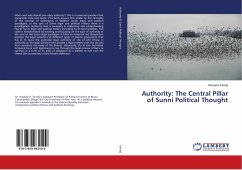When and why should one obey authority? This is a universal question that transcends time and space. This book argues that similar to the centrality of the concept of sovereignty in Western social, legal, and political paradigms, at the core of Sunni legal and political history there is a paradigmatic authority that is necessary in evaluating and understanding Islamic Sunni legal and political history according to its local qualities. This claim is demonstrated by locating and focusing on the type of authority at the core of the Sunni legal paradigm. It finds an historical red thread that explains the legal evolution of different types of Islamic governance that has at its locus the perennial legal authority of Ulu Al Amr (those in authority or the legal scholars who possess a legal mastery over the sources that constitute the body of the Sharia). Historically, Ulu Al Amr furnished temporal force with legitimacy to rule through the legal process of Bay¿a (a contract in a form of an oath of allegiance to a leader) to rule over the Umma (the community of the Muslim believers).
Hinweis: Dieser Artikel kann nur an eine deutsche Lieferadresse ausgeliefert werden.
Hinweis: Dieser Artikel kann nur an eine deutsche Lieferadresse ausgeliefert werden.








